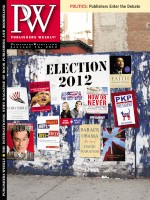When exactly did Amazon become the generic for bookstore? When did it become accepted, standard policy to fill in the “available @” with only its name and not with the name of a particular bookstore? When did the letter go out to journalists at newspapers, magazines, blogs, commentators on public radio, and other radio and TV shows that Amazon deserved to be given hundreds of thousands of dollars of free advertising through the invocation of its name as the “go to” place from which to purchase books? The irony is that you cannot actually “go” there.
Amazon cannot have the power that it does without the complicity of all who invoke its name as a viable primary source for books and other items. It is not a primary source. It exists nowhere and everywhere concurrently. It has no ties to any community, no loyalty to any customer base, and no commitment to the greater good. Its commitment is to money and power, and control of the market in the macro sense and of us in the micro sense.
It is not benevolent. The company is an entity that morphs according to who is looking; it tracks a manufactured zeitgeist as reflected through the retrieval and then algorithmic manipulation of information culled from purchases and visitation. Do its customers like the seduction and succumbing?
This battle, this trying to wrest critical thinking, individuality, back from the clutches of this ever-expanding empire is exhausting, and the need to do so bewildering. When did otherwise smart, rational people accept the totalitarian behavior of a company and CEO? When did these people, who do not want to be told how to vote or what to do with their bodies and health, acquiesce and embrace this method of commerce? We invite it into our homes where it takes root subverting local businesses and eventually holding local economies hostage to a multibillion-dollar sociopathic (since corporations are considered people) entity.
In reading Colson Whitehead’s brilliant cautionary tale, Zone One, I believe the plague is a metaphor for Amazon. It is that thing consuming us and turning us into zoned-out disengaged people. Zone One is a brilliant indictment of our economy and culture. We are eating ourselves alive in the name of more and cheap. Some of Whitehead’s phrases that resonated with me and are worth thinking about—isolated from the text though they be—include “Early in the reboot, Buffalo agreed on the wisdom of rebranding survival.” “They belonged to a nation that adored shortcuts and the impulse persisted.” “His parents were holdouts in an age of digital multiplicity, raking the soil in lonesome areas of resistance...” “What the plague had always told its hosts: I am going to eat you up.” “In turn they had to rewind catastrophe.” And finally, “When we put it back together we will institutionalize joy.”
When did we give up and lay prone as this bully savaged our economy? We become enraged and outraged at the thought of banks manipulating our economy, getting away with unfair practices, ruining communities. Yet we invite one of the most insidious, controlling, greedy agents into our sphere and invoke its name as if it were as benign as saying Kleenex.
When will it be understood that independent booksellers are not affiliates and will not advocate on behalf of skewed economics? When will it be acknowledged that Amazon’s pricing makes for unfair expectations in our customers? We cannot match its prices because we cannot afford to use our livelihoods as loss leaders, and neither can writers nor publishers.
At this time of year when impulses tend to be generous, I must acknowledge mine aren’t: not to the plague that would consume us all and belch out gaseous remnants of our culture.
So, in writing this, my hope for 2012 and beyond is that as we chase the future, the local and independent are wildly present and healthy and that they who make decisions about books and placement have the courage to recognize their power to change the course of the industry by choosing independence.
Lucy Kogler is the manager of Talking Leaves... Books in Buffalo, N.Y., and the president of New Atlantic Independent Booksellers Association.



 Volume 259
Issue 03
01/16/2012
Volume 259
Issue 03
01/16/2012





